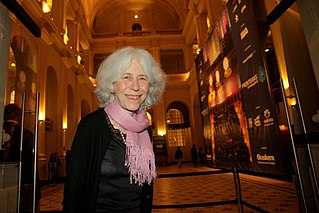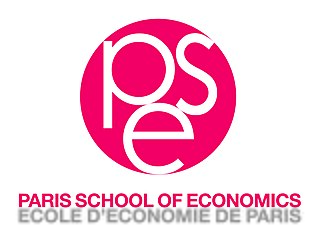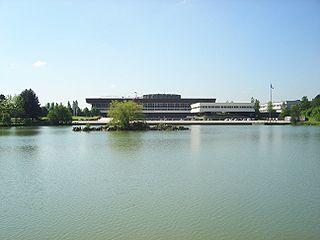Related Research Articles

Télécom Paris is a French public institution for higher education and engineering research. Located in Palaiseau, it is also a member of the Institut Polytechnique de Paris and the Institut Mines-Télécom. In 2021 it was the sixth highest ranked French university in the World University Rankings, and the 7th best small university worldwide. In the QS Ranking, Télécom Paris is the 64th best university worldwide in Computer Science.

The École Polytechnique is one of the 204 French engineering schools accredited as of 1st September 2020 to award a diplôme d'ingénieur. It is one of the most prestigious and selective grandes écoles in France. It is also along with l'École spéciale militaire de Saint-Cyr, l'École de l'air, l'ENSTA Bretagne, l'École des officiers de la Gendarmerie nationale, l'École navale and l'École de santé des armées — one of the seven major French military schools. It is a French public institution of higher education and research in Palaiseau, a suburb south of Paris. The school is a constituent member of the Polytechnic Institute of Paris.

ENSAE Paris is a university in France, known as Grandes Ecoles and a member of IP Paris. ENSAE Paris is known as the specialization school of École Polytechnique for statistics, data science and machine learning. It is one of France's top schools of economics and statistics and is directly attached to France's Institut national de la statistique et des études économiques (INSEE) and the French Ministry of Economy and Finance.
François Bourguignon is the former Chief Economist (2003–2007) of the World Bank. He has been the Director of the Paris School of Economics, and from 1985 to his retirement in 2013 a professor of economics at the École des Hautes Études en Sciences Sociales in Paris. in 2016 Bourguignon was awarded the Dan David Prize. He focus on the study of Income and Wealth inequality, Economy wide country studies, International Trade and Trade policy, Education, and Wealth, income, redistribution and tax policy.
Jean-Jacques Marcel Laffont was a French economist specializing in public economics and information economics. Educated at the University of Toulouse and the Ecole Nationale de la Statistique et de l'Administration Economique (ENSAE) in Paris, he was awarded PhD in economics by Harvard University in 1975.

Dominique Foray holds the Chair of Economics & Management of Innovation at the EPFL in the Collège du Management de la Technologie.

Jean Tirole is a French professor of economics at Toulouse 1 Capitole University. He focuses on industrial organization, game theory, banking and finance, and economics and psychology. In 2014 he was awarded the Nobel Memorial Prize in Economic Sciences for his analysis of market power and regulation.

Emma Georgina Rothschild is a British economic historian who is a professor of History at Harvard University. She is also the director of the Joint Centre for History and Economics at Harvard University and an honorary Professor of History and Economics at the University of Cambridge. She formerly served as board member of United Nations Foundation and as a professor at the École des hautes études en sciences sociales (EHESS) in Paris.

The Paris School of Economics is a French research institute in the field of economics. It offers MPhil, MSc, and PhD level programmes in various fields of theoretical and applied economics, including macroeconomics, econometrics, political economy and international economics.
Gilles Saint-Paul is a French economist at Paris School of Economics. He also is a scientific advisor to the Economic Studies Directorate at the French Ministry of the Environment. His main interests include the political economy of unemployment and how information technology affects wage inequality.
Roger Guesnerie is an economist born in France in 1943. He is currently the Chaired Professor of Economic Theory and Social Organization of the Collège de France, Director of Studies at the École des hautes études en sciences sociales, and the chairman of the board of directors of the Paris School of Economics.
Thomas Philippon is a French economist and professor of finance at the New York University Stern School of Business.
Jacques Mistral is a French economist and professor. He is a member of the Council of Economic Analysis in France, a member of the Cercle des économistes, and as of October 2009, a member of the scientific council of the center-right think tank Fondation pour l'innovation politique.
Roland Bénabou is a French economist, who is currently the Theodore A. Wells '29 Professor of Economics and Public Affairs at Princeton University. He is also a research associate at the Collège de France.

Pierre Cahuc is a French economist who currently works as Professor of Economics at Sciences Po. He is Program Director for the IZA Institute of Labor Economics's programme "Labour Markets" and research fellow at CEPR. His research focuses mainly on labour economics and its relationship with macroeconomics. In 2001, he was awarded the Prize of the Best Young Economist of France for his contributions to economic research. He belongs to the most highly cited economists in France and Europe's leading labour economists.
Stéfanie Stantcheva is a Bulgarian-born French economist who is a professor of economics at Harvard University. She is a member of the French Council of Economic Analysis. Her research focuses on public finance—in particular questions of optimal taxation. In 2018, she was selected by The Economist as one of the 8 best young economists of the decade. In 2020, she was awarded the Elaine Bennett Research Prize.
Gabrielle Demange is a French economist and currently a professor at the Paris School of Economics. She is on the council of the Econometric Society and a fellow on the CEPR.

The Polytechnic Institute of Paris is a research university system located in Palaiseau, France. It consists of five engineering schools: École Polytechnique, ENSTA Paris, ENSAE Paris, Télécom Paris and Télécom SudParis.
Pierre-André Chiappori is a French-Monégasque economist currently E. Rowan and Barbara Steinschneider Professor of Economics at Columbia University. His research focuses on household behavior, general equilibrium and mathematical economics.
Bernard Salanié is a French economist. He is professor of economics at Columbia University. He was formerly the director of ENSAE ParisTech and the Center for Research in Economics and Statistics.
References
- ↑ "Economics | CREST" . Retrieved 2021-03-06.
- 1 2 "Excavating the Academia/Policy pipeline:". Rebuild Macro. Retrieved 2021-03-06.
- ↑ "Episode 910: Economics, Sexism, Data". NPR.org. Retrieved 2019-10-15.
- ↑ "Economic Rockstar : 110: Beatrice Cherrier on the Economics of 'The Wire' and the Beginning of Economics at MIT sur Apple Podcasts". Apple Podcasts. Retrieved 2019-10-15.
- ↑ "BBC Radio 4 - One to One, Soumaya Keynes meets Beatrice Cherrier". BBC. Retrieved 2019-10-15.
- ↑ "Curriculum Vitae of Beatrice Cherrier" (PDF). October 2020. Archived (PDF) from the original on 2021-11-18.
- ↑ "Béatrice Cherrier a reçu la Médaille de bronze du CNRS 2021 | CREST" . Retrieved 2021-11-29.
- ↑ "Institute for New Economic Thinking". Institute for New Economic Thinking. Retrieved 2019-10-15.